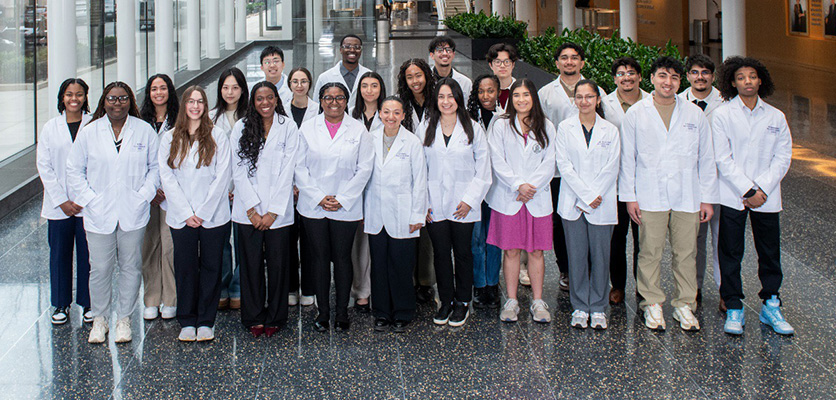Author: kwm107
-

Global Health Education Day Celebrates Mentorship and Collaboration
Faculty, staff, students and trainees celebrated global health, education and outreach during the 6th annual Global Health Education Day organized by the Center for Global Health Education.
-

John Rogers Elected to the Royal Society
Northwestern bioelectronics pioneer John A. Rogers, PhD, has been elected as a Fellow of the Royal Society, the United Kingdom’s national academy of science and one of the most prestigious academies in Europe.
-

Celebrating Honors Day 2025
Fourth-year medical students and faculty members were recognized for academic and clinical excellence during Feinberg’s Honors Day, held on May 16 in the Hughes Auditorium.
-

New Wearable Tech Simulates Realistic Touch
In a study published in Science, Northwestern University engineers have unveiled a new technology that creates precise movements to mimic complex sensations including pressure, vibration and stretching.
-

The Antibiotic That Takes the Bite Out of Lyme
A new Northwestern study shows piperacillin, an antibiotic, effectively cured mice of Lyme disease at a dose 100 times smaller than the effective dose of doxycycline, the current gold-standard treatment.
-

Post-Treatment Lyme Disease Syndrome May Be Driven by Remnants of Infection
A new Northwestern study may explain why the body may continue to respond to an invisible threat long after bacterial death in Lyme disease.
-

Northwestern Launches Pioneering Medical Research Institute With $10 Million Gift From Trustee Kimberly Querrey, Bringing Her Total University Giving to $391 Million
Northwestern University Trustee Kimberly K. Querrey has made a $10 million gift to create and enhance the Querrey Simpson Institute for Regenerative Engineering at Northwestern University.
-

ALS Drug Effectively Treats Alzheimer’s Disease in New Animal Study
A small-molecule compound developed by Northwestern scientists improves neuron health in animal models of Alzheimer’s disease, according to a new study published in PNAS.
-

Leading Precision Medicine Expert, Mohamed Abazeed, MD, PhD, Named Chair of Radiation Oncology
Mohamed Abazeed, MD, PhD, associate professor of Radiation Oncology and co-leader of the Robert H. Lurie Comprehensive Cancer Center of Northwestern University’s Lung Cancer Program, has been named chair of the Department of Radiation Oncology.
-

NUDOCS Program Guides Aspiring Physicians on the Path to Medicine
Northwestern undergraduate students interested in pursuing careers in medicine recently participated in the NUDOCS program, an immersive experience designed to provide hands-on exposure to clinical and community healthcare settings.






